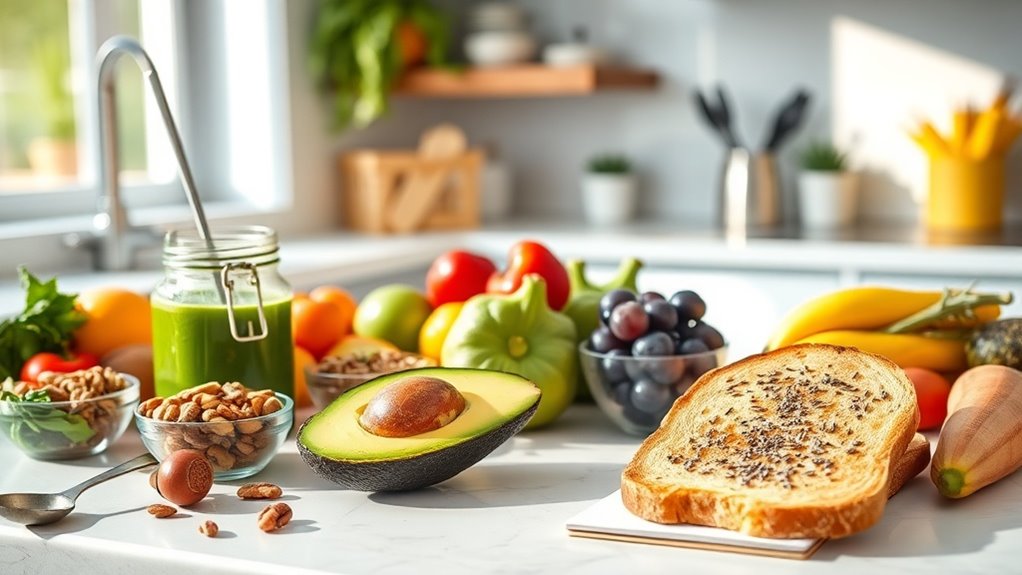Diet Hacks That Actually Work (Backed by Nutritionists)
If you’re looking to make meaningful changes to your diet, understanding effective diet hacks can be a game-changer. Effective strategies, backed by nutritionists, emphasize practical approaches like portion control and mindful eating. These techniques not only help you enjoy your meals more but also support sustained weight management. Curious about how simple swaps and meal planning can transform your eating habits? There’s much more to explore.
Portion Control Strategies
Mastering portion control is crucial for maintaining a healthy diet and achieving your wellness goals.
One effective diet hack is using smaller plates, which naturally limits your serving sizes. You can also measure your food with cups or kitchen scales to ensure accuracy.
Additionally, pre-portioning snacks helps prevent overeating while keeping you mindful of your intake. Simple adjustments can make a significant difference!
Mindful Eating Techniques
Although it might seem challenging, incorporating mindful eating techniques into your routine can transform your relationship with food.
Start by eating without distractions—no screens or books. Focus on savoring each bite, paying attention to flavors and textures.
Tune into your hunger and fullness cues, and consider pausing between bites. Research shows that these practices can enhance satisfaction and reduce overeating.
Hydration Hacks for Better Health
Staying properly hydrated is essential for overall health, and it can be easier than you think.
Carry a reusable water bottle to remind yourself to drink throughout the day. Try infusing water with fruits or herbs for flavor.
Set hydration goals, like drinking a glass before meals. Lastly, listen to your body; thirst is a natural cue that you need more fluids.
Simple Swaps for Healthier Meals
Hydration plays a key role in maintaining your health, but what you eat can make just as big of an impact on your wellness journey.
Consider these simple swaps for healthier meals:
- Choose whole-grain bread instead of white.
- Opt for Greek yogurt over sour cream.
- Use olive oil instead of butter.
- Replace sugary drinks with water or herbal tea.
These small changes can enhance your nutrition!
The Power of Meal Planning
Everyone can benefit from effective meal planning, as it streamlines your cooking process and fosters healthier eating habits. By preparing your meals in advance, you save time and reduce impulse eating. Here’s a simple example of a meal plan:
| Meal | Ingredients |
|---|---|
| Breakfast | Oatmeal, fruit |
| Lunch | Grilled chicken, salad |
| Snack | Nuts, yogurt |
| Dinner | Salmon, veggies |
| Dessert | Dark chocolate |
Incorporating More Fiber Into Your Diet
If you want to enhance your overall health, incorporating more fiber into your diet is essential. Aim for these high-fiber sources:
-
Fruits: Berries and apples provide great fiber.
-
Vegetables: Broccoli and carrots boost your intake.
-
Legumes: Lentils and black beans are excellent choices.
-
Whole grains: Oats and quinoa offer substantial fiber benefits.
These foods can improve digestion and maintain a healthy weight.
Healthy Snacking Tips
What’re some effective strategies for healthy snacking?
Choose nutrient-dense options like fruits, veggies, or nuts to keep you satisfied.
Pre-portion your snacks to avoid mindless eating and aim for a mix of protein and fiber to stabilize your blood sugar.
Stay mindful during snack time, focusing on your food to improve satisfaction and prevent overeating.
Prioritizing health doesn’t have to be complicated!
The Importance of Balanced Macronutrients
Achieving a balanced intake of macronutrients—carbohydrates, proteins, and fats—is crucial for optimal health and energy levels.
Focus on these four key components:
-
Carbohydrates: Fuel your body, especially for workouts.
-
Proteins: Support muscle repair and growth.
-
Fats: Aid in nutrient absorption and hormone production.
-
Fiber: Promotes digestive health and satiety.
Balancing these ensures you feel energized and satisfied.
Understanding Food Labels
How can you make informed choices about what you eat? Understanding food labels is key. Look out for serving sizes, calories, and ingredient lists. Here’s a helpful breakdown:
| Nutrient | Importance |
|---|---|
| Serving Size | Helps gauge portion control |
| Calories | Aids in energy management |
| Sugars | Watch for added sugars |
| Fiber | Essential for digestion |
| Ingredients | Choose whole, familiar items |
Leveraging Probiotics for Gut Health
Although many people overlook gut health, it plays a crucial role in overall wellness, and leveraging probiotics can significantly enhance it.
Consider these effective ways to incorporate probiotics into your diet:
- Enjoy yogurt with live cultures.
- Add kefir to smoothies.
- Snack on fermented veggies like kimchi.
- Try probiotic supplements when needed.
These strategies can boost your gut health and improve digestion.


